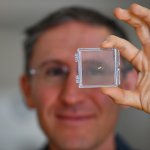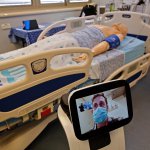UK Healthcare System Trials Smart Glasses For Community Nurses

The history of so-called ‘smart glasses’ is a checkered one, with Google Glass being one of the first players in the field back in 2013, and then stumbling to find a mass commercial appeal. Where they have always had potential though is in the field of medtech (medical technology). Now, a UK pilot scheme is using smart glasses in a trial by nurses on home visits, to deepen both the levels of care that can be delivered and, equally crucially, automatically share healthcare data concerns with a remote medical team.
The glasses, being trialled by the Northern Lincolnshire and Goole NHS Foundation Trust area (part of the UK’s socialized medical system) will be worn by the home visit nurses, and live footage will be shared in real time with hospital colleagues, allowing for immediate second opinions to be sought, and judgements either countered or corroborated.
That, it’s hoped, will speed up the process of treatment and cut out both some of the red tape which previously typified the system, and the reliance on a single nurse’s impressions during a home visit to activate a medical team’s intervention as and when necessary.
By getting an instant second opinion, the glasses should eliminate the necessity for follow-up appointments to be requested and booked, at a time when the UK’s healthcare system is widely regarded as being ‘at breaking point’ after decades of underfunding and the impact of the Covid pandemic. The technology is expected to result in faster treatment and better patient outcomes – though it’s important to stress that this remains a trial of the smart glasses concept in a major UK healthcare district.
The Ubiquitous Computer
Smart glasses were originally conceived as a kind of ‘ubiquitous computer’ – a computer you could take anywhere, and that would combine camera facilities with system connectivity – and it’s this combination of functions that it’s hoped will bring the time benefits to patients in the trial (and potentially beyond). The glasses – which are like significantly thinner, less bulky VR goggles – will automatically transcribe appointments onto the patient’s electronic medical records, cutting the bureaucracy, in a kind of healthcare digital transformation.
It’s also hoped that the new glasses will help to maximize the amount of time the nurses then get to spend with patients (again, by minimizing the bureaucracy of the reporting and appointment process). They’re expected to free up time for other essential clinical duties like wound management, blood pressure and blood glucose assessment, and also delivering the pastoral care element of simply talking to the patients and taking an interest in them.
That’s a much bigger deal than many civilians might immediately understand, as on current estimates, the community nurses who are trying out the glasses spend half their day doing data entry and paperwork by hand. It’s hoped that the glasses will make a comprehensive difference to the amount of time spent in form-filling, and free nurses to be nurses again.
Going Beyond Standard Observation
But there’s more to the latest generation of smart goggles that meets the…eye.
The glasses will do more than just allow remote medical teams to get a visual impression of the patient and vastly reduce the paperwork time. They’re also fitted with thermal imaging, to give nurses (and their remote teams) a much clearer indication how wounds and injuries are healing.
This is a landmark development, because traditionally in UK community nursing, there has been neither the budget nor the technology to use thermal imaging in this way. So as well as cutting the bureaucracy, giving nurses back their nursing time, and allowing remote teams to give immediate second opinions, the trial represents a fundamental increase in data-integrity in terms of wound care.
In the UK, using thermal imaging to check on wound and injury care would usually require not only a hospital visit – which with older patients might not in any case be feasible – but also might not be an option, simply because the technology level is too high and too expensive to warrant its use in this way. A nurse’s visual inspection and the patient’s subjective experience of pain levels have always traditionally been as far as such an examination could go.
Show Me The Money!
In fact, the money remains a question hanging over implementation of the smart glasses in UK healthcare. The Northern Lincolnshire and Goole NHS Foundation Trust was awarded £400,000 (over $471,000) to trial the technology, with a further 16 similar medtech pilot schemes to follow across the country in the next few months as part of the Digital PODAC Unified Tech Fund.
The software used in the smart glasses, known as A.Consult, was developed by Concept Health. Whether the funding will be there to see wholesale adoption of the smart glasses, assuming the trial produces favorable results, remains to be seen – though the NHS Long Term Plan (the government’s strategy document on the national medical system) includes a commitment to use the latest technology “across the country.”
While the future of the UK’s NHS and its free-at-the-point-of-need funding model hangs in the balance, trials of technology like the smart glasses in a large study could have positive outcomes on their use in nursing and medical environments around the world.










